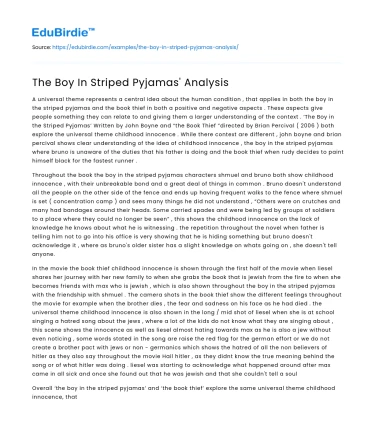Introduction
John Boyne's novel, The Boy in the Striped Pyjamas, is a poignant exploration of innocence amidst the harrowing backdrop of World War II, specifically the Holocaust. The narrative follows Bruno, a young boy whose father is a high-ranking Nazi officer, and his friendship with Shmuel, a Jewish boy imprisoned in a concentration camp. This essay delves into the thematic essence of the novel, examining its portrayal of innocence, the moral quandaries that arise in the face of systemic evil, and the implications of historical memory in literature. By analyzing these elements, we can understand how Boyne's work serves as both a narrative of friendship and a stark reminder of the atrocities of the past. Moreover, the novel raises pertinent questions about the role of historical fiction in educating younger generations about complex and painful histories. Through this analysis, we aim to uncover the layers of meaning embedded in the narrative and evaluate its impact on contemporary readers.
Thematic Exploration of Innocence and Friendship
At the heart of The Boy in the Striped Pyjamas lies the theme of innocence, embodied in the unlikely friendship between Bruno and Shmuel. Bruno's innocence is starkly apparent as he remains oblivious to the grim realities surrounding him. Scholar Naomi Lesley notes that Bruno's journey is a "narrative of innocence lost," highlighting how his naive perception of the world is gradually challenged by his interactions with Shmuel. Their friendship, developed through the fence that separates them, is a poignant metaphor for the artificial barriers constructed by prejudice and hatred.
Save your time!
We can take care of your essay
- Proper editing and formatting
- Free revision, title page, and bibliography
- Flexible prices and money-back guarantee
The innocence of the boys serves as a powerful narrative device, contrasting sharply with the brutal environment of the concentration camp. This juxtaposition emphasizes the senselessness of racial hatred and the arbitrary nature of the divisions imposed by the Nazi regime. Boyne's narrative choice to depict events through Bruno's perspective underscores the tragedy of the Holocaust, as it denies the children the innocence and carefree childhood they deserve. The novel thus becomes a testament to the resilience of the human spirit, even in the face of unimaginable horrors.
However, some critics argue that Boyne's portrayal of innocence oversimplifies the complexity of WWII and the Holocaust. For instance, historian Robert Eaglestone suggests that the narrative's reliance on innocence might dilute the historical accuracy and gravity of the events. Nonetheless, the novel's focus on friendship amidst adversity serves as an entry point for younger audiences to engage with this dark chapter in history, fostering empathy and understanding.
Moral Ambiguities and Ethical Dilemmas
The novel is replete with moral ambiguities, primarily illustrated through the character of Bruno's father, Ralf. As a Nazi commandant, Ralf embodies the conflict between familial loyalty and moral responsibility. Boyne's portrayal of Ralf is nuanced, revealing a man who compartmentalizes his professional duties from his personal life. This depiction raises critical questions about complicity and the ethical dilemmas faced by individuals in positions of power during the Holocaust.
Bruno's mother, Elsa, further exemplifies these moral complexities. Her gradual realization of the camp's horrors and subsequent moral awakening represents the internal conflict experienced by many Germans who were aware of the atrocities yet felt powerless or unwilling to intervene. This internal struggle is poignantly captured when she expresses her disapproval of the camp, stating, "We don't have the luxury of thinking. Some people make all the decisions for us."
Critics like Claudia Glunz argue that Boyne's characterizations risk oversimplifying the moral responsibilities of individuals during the Holocaust. Nonetheless, these characters serve as a vehicle for exploring the broader ethical challenges faced by society, prompting readers to reflect on the consequences of moral disengagement and the importance of individual agency in resisting systemic evil.
Historical Memory and the Role of Fiction
The Boy in the Striped Pyjamas serves as a vital tool for preserving historical memory, particularly in educating younger audiences about the Holocaust. Boyne's narrative approach, through the lens of a child's perspective, simplifies complex historical events, making them accessible and relatable. This aligns with the views of educational theorists like Jerome Bruner, who advocate for narrative as a means to foster understanding and empathy.
However, the novel has sparked debates regarding the responsibilities of historical fiction. Critics like Ruth Franklin caution against the potential for historical inaccuracies, arguing that fiction should not replace rigorous historical scholarship. Boyne himself acknowledges the fictional nature of his work, emphasizing its role in sparking dialogue and introspection rather than serving as a definitive historical account.
Despite these criticisms, the novel's impact on readers is undeniable. By humanizing historical events through the eyes of children, Boyne encourages readers to confront the moral and ethical questions posed by history. This approach not only enhances historical understanding but also underscores the importance of remembrance in preventing future atrocities. Ultimately, the novel illustrates how fiction can complement historical education, offering a nuanced perspective that challenges readers to reflect on their own moral compasses.
Conclusion
In conclusion, John Boyne's The Boy in the Striped Pyjamas offers a compelling exploration of innocence, moral ambiguity, and historical memory. Through the friendship of Bruno and Shmuel, the novel poignantly highlights the senselessness of prejudice and the enduring power of human connection. Despite criticisms regarding historical accuracy, the narrative's emotional resonance underscores its value as an educational tool. By addressing complex themes through a child's perspective, Boyne invites readers to engage with history in a meaningful way, fostering empathy and understanding. As we reflect on the novel's themes, it is imperative to recognize the role of fiction in shaping our perceptions of history and its potential to inspire future generations to confront the moral challenges of their time. Ultimately, The Boy in the Striped Pyjamas remains a significant work in Holocaust literature, reminding us of the enduring impact of innocence and the necessity of remembrance.






 Stuck on your essay?
Stuck on your essay?

